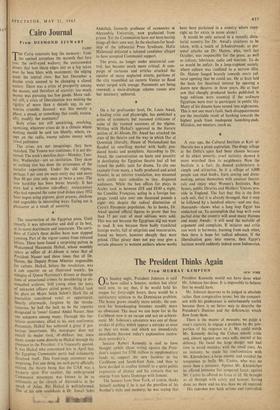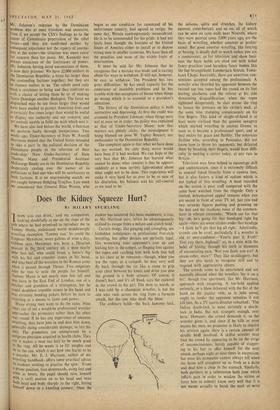The President Thinks Again
From MURRAY KEMPTON
NEW YORK
ON Sunday night. President Johnson is said to have called a Senator, restless but silent until now, to say that, if he would hold his tongue for forty-eight hours, there would be a satisfactory solution to the Dominican problem. The house grows steadily more untidy; the con- cern for housekeeping becomes steadily more an obsession. The. most we can hope for in the Caribbean now is an escape and not an achieve- ment. Mr. Johnson's adventure was one of those strokes of policy which appear a mistake as soon as they are made, and which are immediately identifiable because today's explanation contra- dicts yesterday's.
Senator Robert Kennedy is said to have thought awhile about voting against the Presi- dent's request for 5700 million in supplementary funds to support the new burdens in the Caribbean and South-East Asia, and then to have decided to confine himself to a quiet public expression of dismay and his concern that we emerge from Santo Domingo with honour.
The Senator from New York, of course, thinks himself nothing if he is not the guardian of his brother's style and memory; he was saying that President Kennedy would not have done what Mr. Johnson has done. it is impossible to believe that he would have.
Mr. Johnson deserves to be judged in absolute rather than comparative terms; but the compari- son with his predecessor is unfortunately useful because there is no better way to describe the President's illusions and the deficiencies which flow from them.
There is the matter of measure; we judge a man's capacity to engage a problem by the pro- portion of his response to it. We could watch Mr. Kennedy during the Cuban missile crisis and, almost against our own wilts, marvel at his delicacy. He faced the large danger and had time to avoid mistakes with the small ones. As an instance, he made his confrontation with Mr. Khrushchev, a large enemy, and avoided the temptation to bully Mr. Castro, who was no more than a nuisance. Against Mr. Khrushchev he offered immense but tempered force; against Mr. Castro he offered no force at all. He brought us all through with safety and honour, having done no more and no less than we all required.
His resnonse was both serious and controlled;
Mr. Johnson's response to the Dominican problem was at once frivolous and excessive. Even if we accept the CIA's findings as to the extent of Communist penetration of the rebel forces--and they are confirmed neither by subsequent experience nor the reports of journa- lists at the scene—the situation was more cause for concern than for panic. Mr. Kennedy was always conscious of the limitations of power. Mr. Johnson, having acted unconscious of them, is now their prisoner. We have 22,000 soldiers in the Dominican Republic, a force far larger than the contending factions together; but they are in essence useless to us. The rebels need only keep a resistance in being and they confront us with a choice of letting them be or of making Santo Domingo another Budapest. The force we dispatched may be ten times larger than would have been needed to protect American lives and is certainly five times larger than would be useful to display our authority and our concern, and Yet entirely unable to fulfil the wish which sent it.
We have also lied before the world, a function We perform badly through inexperience. Two weeks ago, Under-Secretary of State W. Averell Harriman denied that the United States intended to take a part 'in the political decision of the Dominican people in the selection of their leadership.' Now Under-Secretary of State Thomas Mann and Presidential Assistant McGeorge Bundy are in the Dominican Republic desperately casting over the names of its Politicians to find one who will be satisfactory to both factions. It is an unpromising search; we are caught between fledgling Trujillos. Last week we announced that General Elias Wessin, who
began as our candidate for command of his unfortunate country, had agreed to resign; the same day, Wessin contemptuously reconsidered. He is to be commended for his pride; it had not lately been thought the business of the United States of America either to install or to depose strong men in smaller countries. We have then all the penalties and none of the visible fruits of intervention.
It must be said for Mr. Johnson that he recognises that a mistake was made and is casting about for ways to withdraw. It will not, however, be easy to withdraw. The President has two great difficulties: he has small capacity for the endurance of insoluble problems and he has trouble with that acceptance of blame when things go wrong which is so essential to a president's education.
The history of the Dominican policy is both instructive and depressing. At first the credit was assumed by President Johnson; when things were not at once set in order, the policy was explained as that of Under-Secretary Mann; now that matters are plainly sticky, the misjudgment is being blamed on poor W. Tapley Bennett, our ambassador to the Dominican Republic.
The complaint again is that what we have done has not worked; the only thing worse would have been if it had worked. We can hope at the very, best that Mr. Johnson has learned what cannot be done; what remains is that he appears suddenly as a man terribly light-minded about what ought not to be done. This experience will make it very hard for us ever to be as sure of his discretion, his balance and his self-control as we used to be.































 Previous page
Previous page